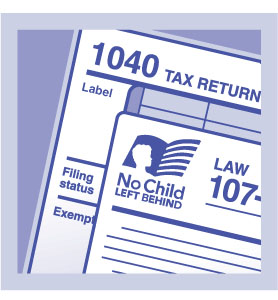The Bush Tax Cuts and an (Obviously?) Unnecessary Dilemma
 That the Bush Tax cuts will be of issue in the upcoming Congressional session is, at this point, all but fate. Lame though the duck might be, it will no doubt have some water to tread on this particular issue.
That the Bush Tax cuts will be of issue in the upcoming Congressional session is, at this point, all but fate. Lame though the duck might be, it will no doubt have some water to tread on this particular issue.
And although the ultimate destiny of Bush’s contributions to the nation’s tax-scheme remains uncertain, the terms of the debate are coming somewhat more clearly into sight. Congressional Republicans, for their part, look posed to push for a whole-scale extension. The Dems, in contrast, appear ready to keep the tax-cuts in play for all but the country’s top earners. And, with that basic set of choices in mind, Frank Rich noted the following:
“It’s the very top earners, not your garden variety, entrepreneurial multimillionaires, who will be by far the biggest beneficiaries if there’s an extension of the expiring Bush-era tax cuts for income over $200,000 a year (for individuals) and $250,000 (for couples). The resurgent G.O.P. has vowed to fight to the end to award this bonanza, but that may hardly be necessary given the timid opposition of President Obama and the lame-duck Democratic Congress.”
Without delving into things too critically, all of the important pieces and prizes—top earners, top tax bracket and big winnings—seem to be at work in Rich’s analysis. Still using “the very top earners” as his reference group, Rich then goes on to make what appears to be a straightforward leap:
“Many of the countless tasks that need to be addressed to start rebuilding an equitable America are formidable, but surely few, if any, are easier than eliminating a tax break that was destined to expire anyway and that most Americans want to see expire.”
In all of this, however, Rich leaves a seemingly obvious distinction unmade. Not all, and presumably not most, of those falling in the relevant tax bracket could be remotely considered among America’s super rich. Why, then, should they be treated as such?
Is a full and permanent extension of the Bush tax-cuts an idea without flaw? No, probably not. Is the top tax-bracket a logically relevant, non-arbitrary category? Again, the answer appears to fall somewhat shy of landing wholly in the affirmative. Might, therefore, it make some degree of sense to think about shuffling the brackets themselves… Given the set of explicitly political constraints by which the whole debate will no doubt be bound, one can only wonder…